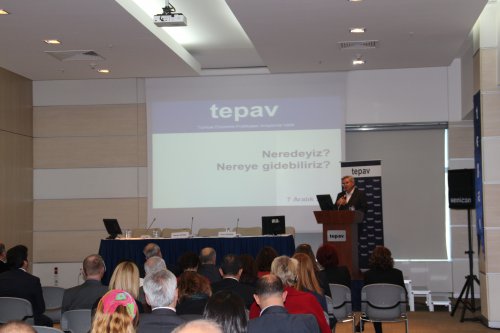“Turkey Needs to Rebrand Vocational Education and Training” Event... The event entitled “Turkey Needs to Rebrand Vocational Education and Training” was held on December 7 in TEPAV, ANKARA.

With the aim of contributing the process of developing relevant skills for industrial upgrading and economic transformation, TEPAV has commenced a Project in the field of vocational education and training, supported by the JPMorgan Chase Foundation.
The meeting began with welcoming remarks by Guven Sak, TEPAV’s Managing Director. During his opening speech, Sak emphasized the necessity of a new growth strategy in Turkey. Stressing that the transformation of the Turkish economy had so far relied on internal migration and cheap labor, Sak said those options had come to an end. He said, “from this point on, we have to devise measures to enhance productivity at the sectoral level. Amongst these measures, education and human capital come forward. We have to readdress Turkey’s institutional infrastructure. From this perspective, we have to think over what could be done in the field of vocational training in order to reshape human capital swiftly.”
The meeting carried on with opening remarks of Nurettin Ozdebir, Chairman of the Ankara Chamber of Industry, and Belma Ozmen, JPMorgan Turkey CFO & COO. Ozdebir highlighted the importance of education of teachers in the process of restructuring the vocational education and training, while Ozmen said “for us, supporting young people to let them improve their skills while they are involving in the labor force is crucial and privileged.”
In the second session of the event moderated by Serdar Sayan, Academic Staff of TOBB Economy and Technology University, Omer Acikgöz, Deputy Undersecretary of Prime Ministry gave a presentation arguing that one of the most important deficiencies in the field of vocational education in Turkey was the lack of vocation map based on de facto evidence. Acıkgoz made the following evaluations:
- Policy recommendations in the field of education are based on perceptions rather than evidence in Turkey. In order to secure a decent policy design, one needs to analyze sociological structure, economic conjuncture, institutions, etc. together.
- There is a supply-demand imbalance in vocational education. Demand cannot determine the supply, and supply cannot create demand. Therefore, lack of quality occurs.
- Income expectation of people is the first motivation of education. This cause a demand pressure on higher education. Moreover, involving in the vocational education does not seem as a real success.
- There is a lack of measurement and evaluation metrics to understand teachers’ performance in Turkey.
- Business and government have to collaborate in the process of restructuring vocational education and training.
- Turkey should leave the implementation of specialization in the secondary education, since it won’t be possible to produce high-tech for students who do not learn primary science during their school life.
- Because of the TEOG (Transition from Basic Education to Secondary Education) exam the most unsuccessful students are placed into vocational schools, which is likely to lead to problems in the future.
- Theoretical vocational education must be integrated with workplace training. The skills set of the current labor force should also be upgraded through in-house training in line with new technologies.
The presentation was followed by a panel discussion moderated by Sibel Guven from TEPAV. Evrim Aras, CEO of Aras Holding and Chair of TOBB Women Entrepreneurship Council, Isil Oral, Policy Analyst of Education Reform Initiative, Bekir Gur, Academic Staff of Yildirim Beyazit University, and Sarp Kalkan, B20 Sherpa for Turkey, spoke during the session.
The Vocational Training Project
Developing relevant skills for industrial upgrading and economic transformation is a key challenge facing many developing and middle-income countries. With the aim of addressing this problem and enhancing the positive outcomes of Specialized Vocational Training Centres Skills’10 Project (UMEM Skills’10), one of the most important projects so far in the field of vocational training in Turkey, TEPAV has started a new project in the field of vocational education and training which is supported by the JPMorgan Chase Foundation.
The JPMorgan Chase Foundation
JPMorgan Chase works with community partners to create pathways to opportunity by supporting workforce development, financial capability and small business development in the regions where it does business. In 2014, JPMorgan Chase gave approximately $200 million to nonprofit organizations in 39 countries where JPMorgan is active.














